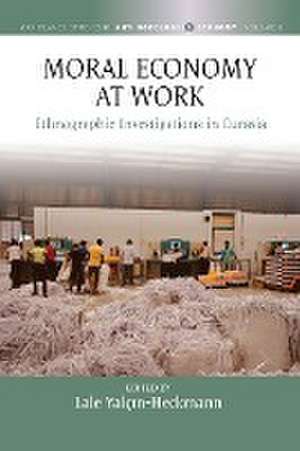Moral Economy at Work: Max Planck Studies in Anthropology and Economy
Editat de Lale Yalç¿n-Heckmannen Limba Engleză Paperback – 15 sep 2023
| Toate formatele și edițiile | Preț | Express |
|---|---|---|
| Paperback (1) | 120.77 lei 3-5 săpt. | +11.78 lei 4-10 zile |
| BERGHAHN BOOKS – 15 sep 2023 | 120.77 lei 3-5 săpt. | +11.78 lei 4-10 zile |
| Hardback (1) | 746.80 lei 6-8 săpt. | |
| BERGHAHN BOOKS – 14 oct 2021 | 746.80 lei 6-8 săpt. |
Preț: 120.77 lei
Nou
Puncte Express: 181
Preț estimativ în valută:
23.11€ • 24.13$ • 19.08£
23.11€ • 24.13$ • 19.08£
Carte disponibilă
Livrare economică 25 martie-08 aprilie
Livrare express 08-14 martie pentru 21.77 lei
Preluare comenzi: 021 569.72.76
Specificații
ISBN-13: 9781805391166
ISBN-10: 180539116X
Pagini: 210
Dimensiuni: 152 x 229 x 12 mm
Greutate: 0.29 kg
Editura: BERGHAHN BOOKS
Seria Max Planck Studies in Anthropology and Economy
ISBN-10: 180539116X
Pagini: 210
Dimensiuni: 152 x 229 x 12 mm
Greutate: 0.29 kg
Editura: BERGHAHN BOOKS
Seria Max Planck Studies in Anthropology and Economy
Notă biografică
Lale Yalçın-Heckmann has been a senior researcher at the Max Planck Institute for Social Anthropology in Halle/Saale and teaches anthropology at the University of Pardubice, Czech Republic. She is the co-editor of Caucasus Paradigms: Anthropologies, Histories and the Making of a World Area (LIT Publishers, 2007) and author of The Return of Private Property: Rural Life after Agrarian Reform in the Republic of Azerbaijan (LIT Publishers, 2010).
Descriere
Descriere de la o altă ediție sau format:
The idea of a moral economy has been explored and assessed in numerous disciplines. The anthropological studies in this volume provide a new perspective to this idea by showing how the relations of workers, employees and employers, and of firms, families and households are interwoven with local notions of moralities.
The idea of a moral economy has been explored and assessed in numerous disciplines. The anthropological studies in this volume provide a new perspective to this idea by showing how the relations of workers, employees and employers, and of firms, families and households are interwoven with local notions of moralities.








